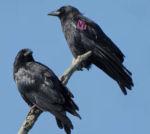It was after I decided to write my M.A. thesis on Olive Schreiner that I became acutely aware of how effectively women writers are “disappeared” by the male literary canon. Yes, it happens to all writers to some degree, as fashions change, but the disappearance of once famous women is much more dramatic. The uppity Monstrous Regiment of Women are put back in their place, their contributions mocked if remembered at all. I was amazed to discover that Schreiner’s essays and novels had once been read all over the world; that she had met Gandhi in South Africa, had influenced Stephen Crane, had had an influential role in the British and South African movements for women’s suffrage. How had I never heard about her before? I kept finding her unaccredited picture in photos of women’s suffrage marches in Britain (at 4′ 11″ with a very pointy nose, she was easy to spot) and references to her in the papers of the famous of the time. Women writers who embodied the cause of their times seem especially susceptible to revisionist rancor, and there’s no question she was an oddity. She wrote about race and class and feminism, but her preoccupations were just as much on the spiritual and moral plane. I finally decided her writing embodied a tragic philosophy, in the way Dostoevsky’s fiction and Nietzsche’s writings did. She was a spiritual evolutionist, a transcendental feminist. Even in her time she was hard to classify, but Virginia Woolf’s parents made sure she was taken to tea to meet the famous author, when she was only a child. It rankled her later that the child had been in no position to ask the questions she later had as an adult.
Born to missionary parents in British South Africa, before South Africa as we know it today even existed, her biggest literary influences were not novels, but rather the philosophical musings of Ralph Waldo Emerson and Herbert Spencer, the author of Spiritual Evolution. She theorized, with the urgency of her time, about what should replace our moral compass in a world where pressure from science and evolutionary theory rendered belief in the conventional idea of God no longer possible. Like Thoreau, Emerson, and Spencer, she replaced God with Nature, and with human intelligence that can see for itself the logic of cause and effect teaching us what we should and should not do, for our own sanity.
The Story of an African Farm is a strange and wonderful book, passionately felt, with an extended parable in the middle, written in Biblical language that completely flummoxed the modern Marxist feminists I read. Schreiner’s sophisticated writings on feminism, economics, and colonialism were comprehensible to them. But the acute spiritual pain she was addressing, her need to replace timeworn pieties with something vital and alive confuses feminists today. At the time, this was as urgent as the political struggles of the suffragettes.
That was part of what prompted me to write about her; it’s rare in graduate school to come across a book or writer where the literary critics all seem to get it wrong. The two exceptions were South African women themselves: Doris Lessing wrote a brilliant essay on the landscape, physical and emotional, that shaped Schreiner and it’s still one of the best essays on Schreiner’s most famous novel, The Story of an African Farm.
The other was Ruth First, who wrote the definitive biography at the time I was writing. When the biography was published, she was an ANC member, working from exile in Zimbabwe before she was killed by a letter bomb from the apartheid government’s secret police. She addressed Schreiner’s writing with great empathy and insight into the moral and social dilemmas Schreiner tried to address in her work.(Ruth First was portrayed by Barbara Hershey in the film A World Apart.)
Schreiner’s other attraction for me was the brilliance of her social analysis of women’s place as mediated by economics and culture — all the things Simone de Beauvoir left out — creating a more grounded analysis. She had grown up witnessing the stark differences between the place of women in the African, Boer, and British cultures around her. In some ways, she was a more accomplished social theorist than novelist. Her small treatise, Woman and Labour was more sophisticated, especially in escaping from the trap of thinking your own milieu somehow reflects “nature.”
I was in the process of recovering from reading too much social science theory (and the passive-voice writing that goes with it) for my cultural Anthropology degree, and here was a marvelous cross-cultural analyses of colonialism, cultural subjugation, and women’s identity defined by her role in the economy (hence her coinage of the term “sex parasitism”). She pointed out that the African women around her were more valued and contributed to the economic well-being of their households in ways English women were unable to do. Hobsbawm and the Marx circle took up her work and popularized it. Havelock Ellis popularized her ideas about women and his own theories about female sexuality (hot stuff at the time!). The suffragettes read her stories and essays to bolster their spirits in between forced feedings in Holloway prison during their hunger strikes.
But I digress.
Recently I read a wonderful “alternate history” set during WWI, Mary Robinette Kowal’s Ghost Talkers. About half way through the story, the main character mentions The Story of an African Farm, remarking that all her female colleagues seem to have a copy. She’s trying to decide if it had been used as a code book to encrypt messages. Kowal did solid research on the role of women in fighting the war, and amplified it with her “ghost talkers” in a way that felt true to the period, if somewhat macabre. I enjoyed it, but I was even more delighted to see Olive referred to as a popular writer. She was!
Happy Birthday, Olive.







